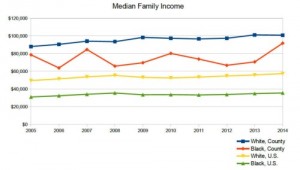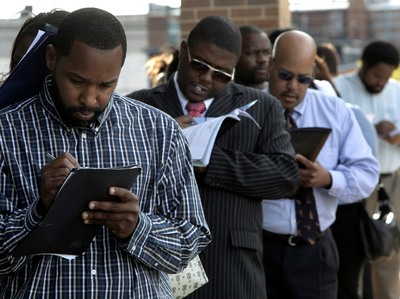(ThyBlackMan.com) American Blacks must cultivate an entrepreneurial spirit independent of any president in the White House. – Armstrong Williams
There is no getting around certain troubling and enduring implications of Black-White differences in America. Is there any question that there are meaningful differences between the races? The typical White household has 16 times the wealth of a Black one. A typical Black household has accumulated less than one-tenth of the wealth of a typical White one. Its true Blacks have become politically active over the past 25 years, mostly as loyal Democrats, the wealth gap between Blacks and Whites has nearly tripled. Actually Blacks haven’t made much progress in closing the economic chasm with Whites since the March on Washington 50 years ago.
Surely people with some prejudices will always be with us. Blacks will continue to be subjected to hostile acts in America, but all too often our upward mobility is curbed by customs of dependency. Too often, Blacks shun enterprise for dependence on the government for their needs. Most of African-American identity is about government. Blacks have reached the highest office in the land, but government has not the answer for Black empowerment. No matter who occupies the White House the plight of America’s Blacks continue to diminish. It’s true that urban politicians have poured billions of dollars into these communities, they’ve not lifted these populations from poverty and despair; and have worsen the plight of many of the nation’s Blacks.
often, Blacks shun enterprise for dependence on the government for their needs. Most of African-American identity is about government. Blacks have reached the highest office in the land, but government has not the answer for Black empowerment. No matter who occupies the White House the plight of America’s Blacks continue to diminish. It’s true that urban politicians have poured billions of dollars into these communities, they’ve not lifted these populations from poverty and despair; and have worsen the plight of many of the nation’s Blacks.
“All flash and no cash” is a suitable profile for Blacks in America. After we get beyond societal privileges that benefit Whites beyond what is commonly experienced by non-Whites under similar circumstances, the races have starkly different views on the appropriate role of government in dealing with civil rights. A majority of Blacks (59 percent) say the government should play a major role in improving their social and economic position, while 19 percent of Whites agree. Over half of Blacks (52 percent) say the country needs new civil rights laws while 15 percent of Whites agree.
Despite good intentions and a twenty-five fold increase in welfare spending since 1967, centrally designed and administered social programs have largely failed to strengthen the indigenous cultural institutions upon which economic advancement depends. Low levels of business growth have retarded savings, investments, and jobs in Black communities. Public policy decisions can support community-based entrepreneurship, but it takes racially-sensitive people to make it work. Blacks haven’t had such racial champions in the Congress since Rep. Parren Mitchell. During a distinguished 16-year career, Mitchell forcefully fought for affirmative action legislation. Thirty years ago, as Chairman of the Small Business Committee, Mitchell attached an amendment to a $4 billion public works bill that compelled state and local governments, seeking federal grants, to set aside 10 percent of the funds to retain minority firms as contractors and subcontractors.
Blacks’ strategies and politicians show that entrepreneurship is a “White thing” that they don’t understand. A majority of contemporary Black Americans have placed their hopes of equality and justice on the government. Whites do not share these views — exemplifying a tension in opinions about whether “mainstream” or “Black” issues dominate political themes and priorities.
Blacks need to celebrate entrepreneurialism, and cease their fixation with being victims. Contrary to what some Blacks seem to think, capitalism is not evil or amoral. In its proper form it encourages such virtues as hard work, cooperation, resolve and deferral of gratification. More Black Americans should advance understanding of the causes, means, and effects of government power and start engaging institutions that protect and advance liberty and prosperity.
For this to be a time of rapid economic change in Black American communities, fresh thinking is needed about our values, institutions and economics. The impetus for change must come from within us and become basic among us and our families that entrepreneurship, not government, is the driving force behind sustained economic progress in industrial societies. For Black Americans to become equal in the American dream, we must harness and stimulate our families’ and communities’ entrepreneurial resources and potential.
Written by William Reed




















As far as I can known, and despite what all media claim, the typical white household doesn’t have sixteen times the wealth of a black one.
There’s a great difference between average and typical : when a few people own a large part of a Nation’s wealth — so in any capitalist country – a group without businessmen (« Blacks’ strategies and politicians show that entrepreneurship is a “White thing” that they don’t understand ») will, artificially, appear far poorer than it really is. Confusion between average and typical will hide the fact that the gap is, at least partly, due to the lack of a bourgeoisie in this group. I don’t know your country (I’m French) well enough to correct such statistics, but on many website I read comments where white people are critic toward these data, saying none they know is as rich as the alleged typical white household.
Another point is that white refers to many different groups. WASP’s are white people, but I suppose that Jews are included in these statistics, whereas they are socially very different from Europeans. In the thirties, rav Arthur Rupin said that currently Jewish people had 320 % of the European people’s wealth. I suppose that, even in the country of the first amendment, none will dare, today, to write about such differences. Jews aren’t the only group to have higher incomes and wealth than white people : Asians are a bit richer too, whereas they had been among the poorer immigrants. In my country, it’s probably the same (statistics by race are forbidden in France ; high fines – possibly jail, whereas never such a sentence had been pronounced so far, for lack of “criminals” – and unemployment, in a country where finding a job is so difficult, are granted) and here too the Asians finally succeded in their own way, whereas poor and, initially, no less subjects to injustice than Blacks or Muslims. They remain together and avoid troubles, as ordinary make everyone, having not been seduced by the gangsta’ rap and such means to corrupt youth. They’re now regarded as polite and peaceful.
Yet another point is the difference between income and wealth. A group without inheritence is poor, even if its income is the same. Between Blacks and Whites in the U.S.A., income difference is no sixteen (100 % for Whites, 6 % for Blacks) but one point five to one point seven (100 % and some 60 % : see website Businessinsider, article The Income Gap between Blacks And Whites Has Only Gotten Worse Since The 1960’s, by Mandi Woodruff), so racial gap, however existing, for sure, regarding income is ten times smaller than suggested by statistics about wealth.
Last but not least, statistics about wealth are given for an artificially created three-person household, making from social differences racial ones. For exemple, 70 % of black women are singles ; due to historical reasons, black familles have been destroyed by modern individualism easier than even the white ones have been. Many black families are women trying to make a normal life for their children without neither a second income nor the help of a second parent. And the single men, white and black, often live poorly, lacking the only good reasons to work hard : the smile if their wife, the laughs of their children.
In my opinion, capitalism is either evil and amoral ; in France, white people suffer from injustices due to white bourgeoisie, and the capitalists try to create quickly an Arabian and a Black immigrant bourgeoisies, and I think the aim is no the burning desire to see someone else becoming rich, but the urgent need to find treators able to fool these new groups.